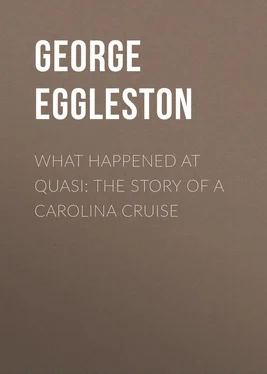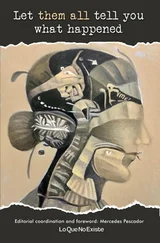George Eggleston - What Happened at Quasi - The Story of a Carolina Cruise
Здесь есть возможность читать онлайн «George Eggleston - What Happened at Quasi - The Story of a Carolina Cruise» — ознакомительный отрывок электронной книги совершенно бесплатно, а после прочтения отрывка купить полную версию. В некоторых случаях можно слушать аудио, скачать через торрент в формате fb2 и присутствует краткое содержание. Жанр: Прочие приключения, foreign_prose, на английском языке. Описание произведения, (предисловие) а так же отзывы посетителей доступны на портале библиотеки ЛибКат.
- Название:What Happened at Quasi: The Story of a Carolina Cruise
- Автор:
- Жанр:
- Год:неизвестен
- ISBN:нет данных
- Рейтинг книги:4 / 5. Голосов: 1
-
Избранное:Добавить в избранное
- Отзывы:
-
Ваша оценка:
- 80
- 1
- 2
- 3
- 4
- 5
What Happened at Quasi: The Story of a Carolina Cruise: краткое содержание, описание и аннотация
Предлагаем к чтению аннотацию, описание, краткое содержание или предисловие (зависит от того, что написал сам автор книги «What Happened at Quasi: The Story of a Carolina Cruise»). Если вы не нашли необходимую информацию о книге — напишите в комментариях, мы постараемся отыскать её.
What Happened at Quasi: The Story of a Carolina Cruise — читать онлайн ознакомительный отрывок
Ниже представлен текст книги, разбитый по страницам. Система сохранения места последней прочитанной страницы, позволяет с удобством читать онлайн бесплатно книгу «What Happened at Quasi: The Story of a Carolina Cruise», без необходимости каждый раз заново искать на чём Вы остановились. Поставьте закладку, и сможете в любой момент перейти на страницу, на которой закончили чтение.
Интервал:
Закладка:
“There’s a spring where I propose to land,” said Cal, by way of reassuring his companions. “As I remember it, the water’s a bit brackish, but it is drinkable at any rate.”
“Are you sure you can find the spot in the dark, Cal?” asked Larry, with some anxiety in his voice. “For it’ll be pitch dark before we get there.”
“Oh, yes, I can find it,” his brother answered.
“There’s a deep indentation in the coast there – an inlet, in fact, which runs several miles up through the woods. We’ll run in toward the shore presently and skirt along till we come to the mouth of the creek. I’ll find it easily enough.”
But in spite of his assurances, the boys, now severely suffering with thirst, had doubts, and to make sure, they approached the shore and insisted that Cal should place himself on the bow, where he could see the land as the boat skirted it.
This left three of them to handle four oars. One of them used a pair, in the stern rowlocks, where the width of the boat was not too great for sculls, while the other two plied each an oar amidships.
In their impatience, and tortured by thirst as they were, the three oarsmen put their backs into the rowing and maintained a stroke that sent the boat along at a greater speed than she had ever before made with the oars alone. Still it seemed to them that their progress was insufferably slow.
Presently Cal called to them: “Port – more to port – steady! there! we’re in the creek and have only to round one bend of it. Starboard! Steady! Way enough.”
A moment later the dory slid easily up a little sloping beach and rested there.
“Where’s your spring, Cal?” the whole company cried in chorus, leaping ashore.
“This way – here it is.”
The spring was a small pool, badly choked, but the boys threw themselves down and drank of it greedily. It was not until their thirst was considerably quenched that they began to observe how brackish the water was. When the matter was mentioned at last, Cal dismissed it with one of his profound discourses.
“I’ve drunk better water than that, I’ll admit; but I never drank any water that I enjoyed more.” Then he added:
“You fellows are ungrateful, illogical, unfair, altogether unreasonable. That water is so good that you never found out its badness till after it had done you a better service than any other water in the world ever did. Yet now you ungratefully revile its lately discovered badness, while omitting to remember its previously enjoyed and surpassing goodness. I am so ashamed of you that I’m going to start a fire and get supper going. I for one want some coffee, and it is going to be made of water from that spring, too. Those who object to brackish coffee will simply have to go without.”
VII
AN ENEMY IN CAMP
No sooner was the camp fire started than Cal went to the boat and brought away a piece of tarpaulin, used to protect things against rain. With this and a lighted lantern he started off through the thicket toward the mouth of the little estuary, leaving Dick to make coffee and fry fish, while Larry mixed a paste of corn meal, water and a little salt, which he meant presently to spread into thin sheets and bake in the hot embers, as soon as the fire should burn down sufficiently to make a bed of coals.
As Cal was setting out, Tom, who had no particular duty to do at the moment, asked:
“Where are you off to, Cal?”
“Come along with me and see,” Cal responded without answering the direct question. “I may need your help. Suppose you bring the big bait bucket with you. Empty the shrimps somewhere. They’re all too dead to eat, but we may need ’em for bait.”
Tom accepted the invitation and the two were quickly beyond the bend in the creek and well out of sight of the camp. As they neared the open water, Cal stopped, held the lantern high above his head, and looked about him as if in search of something. Presently he lowered the lantern, cried out, “Ah, there it is,” and strode on rapidly through the dense undergrowth.
Tom had no time to ask questions. He had enough to do to follow his long-legged companion.
After a brief struggle with vines and undergrowths of every kind, the pair came out upon a little sandy beach with a large oyster bank behind it, and Tom had no further need to ask questions, for Cal spread the tarpaulin out flat upon the sands, and both boys began gathering oysters, not from the solid bank where thousands of them had their shells tightly welded together, but from the water’s edge, and even from the water itself wherever it did not exceed a foot or so in depth. Cal explained that these submerged oysters, being nearly all the time under salt water, and growing singly, or nearly so, were far fatter and better than those in the bank or near its foot.
It did not take long to gather quite as many of the fat bivalves as the two could conveniently carry in the tarpaulin and the bait pail, and as Cal was tying up the corners of the cloth Tom began scrutinizing the sandy beach at a point which the ordinary tides did not reach. As he did so he observed a queer depression in the sand and asked Cal to come and see what it meant.
After a single glance at it, Cal exclaimed gleefully:
“Good for you, Tom. This is the luckiest find yet.”
With that he placed the lantern in a favorable position, emptied the bait pail, hurriedly knelt down, and with his hands began digging away the sand.
“But what is it, Cal? What are you digging for?”
“I’ll show you in half a minute,” said the other, continuing to dig diligently. Less than the half minute later he began drawing out of the sand a multitude of snow-white eggs about the size of a walnut. As Tom looked on in open-mouthed wonder, he thought there must be no end to the supply.
“What are they, Cal?” the boy asked.
“Turtle’s eggs, and there’s a bait bucket full of them. You’ve made the luckiest find of all, Tom,” he said again in congratulation.
“Are they good to eat?”
“Good to eat? Is anything you ever tasted good to eat? Why, Tom, they’re about the rarest delicacy known to civilized man. In Charleston they sell at fabulous prices, when there happen to be any there to sell. Now we must hurry back to the fire, for the ash cakes must be about done and the coffee made.”
After a moment or two of silence, Tom asked:
“Why did you think there was an oyster bank down there, Cal?”
“I noticed it as we came into the creek and I took pains to remember its location. But here we are. See, fellows, what Tom has found! Now bring on your coffee and your ash cakes and your fish, and we’ll feast like a company of Homer’s warriors. It won’t take long to boil the eggs in salt water – ten minutes is the allotted time, I believe, in the case of turtle’s eggs, and during that time we can be eating the other things and filling up with fire-opened oysters.”
With that he threw three or four oysters upon the coals, removing them as soon as they opened and swallowing them from the shell. The others followed his example.
Of course it really was an excellent supper the boys were eating out there under the stars, but sharp-set hunger made it seem even better than it was, and the contrast between it and the supper of bologna sausages and hardtack of the night before, added greatly to the zest of their feasting. They rejoiced, too, in being free, out there in the woodlands, with no dismal rain to depress their spirits and no restraint of any kind upon their liberty.
But they were all very tired after their sleepless night before and their hard-working day, and without argument or discussion, one by one of them stretched himself before the fire not long after supper, and fell asleep. Cal remained awake longer than the rest, though he, too, was lying flat upon his back, ready to welcome sleep as soon as it should come to his eyelids.
Читать дальшеИнтервал:
Закладка:
Похожие книги на «What Happened at Quasi: The Story of a Carolina Cruise»
Представляем Вашему вниманию похожие книги на «What Happened at Quasi: The Story of a Carolina Cruise» списком для выбора. Мы отобрали схожую по названию и смыслу литературу в надежде предоставить читателям больше вариантов отыскать новые, интересные, ещё непрочитанные произведения.
Обсуждение, отзывы о книге «What Happened at Quasi: The Story of a Carolina Cruise» и просто собственные мнения читателей. Оставьте ваши комментарии, напишите, что Вы думаете о произведении, его смысле или главных героях. Укажите что конкретно понравилось, а что нет, и почему Вы так считаете.












